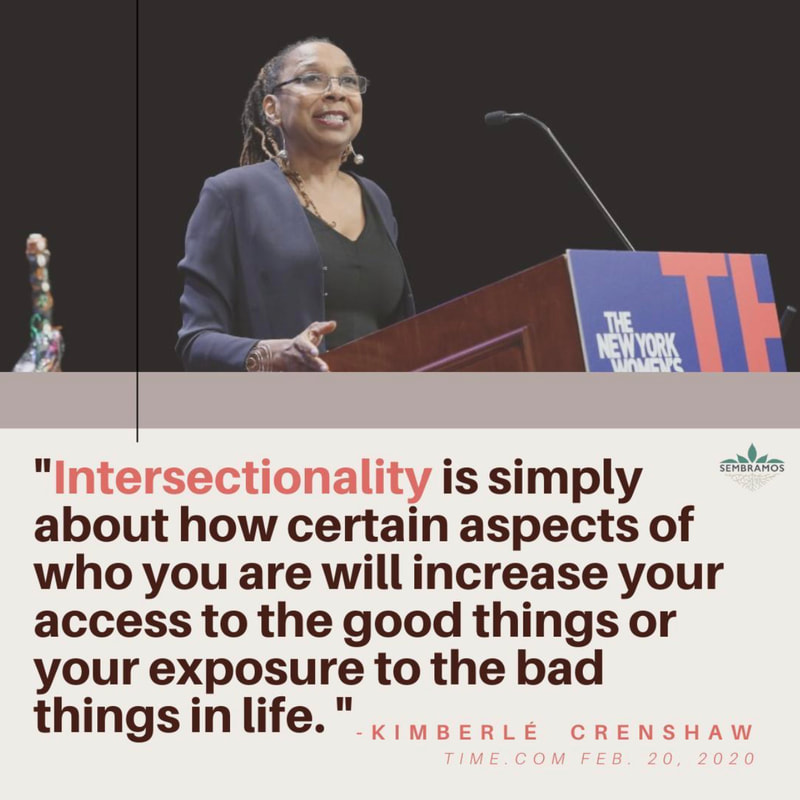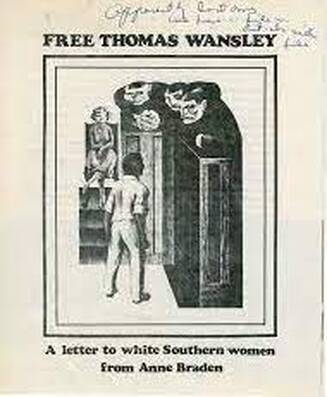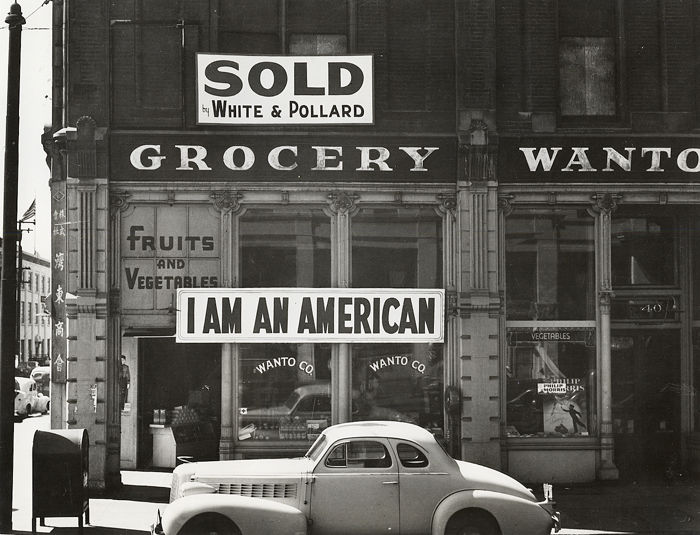Artwork by Tema Okun
A BRIEF HISTORICAL CONTEXT ...
|
As early settlers came to what would become the U.S. from Europe, those in leadership were male and Christian. They did not identify as white. They identified with their ethnic, national, and/or religious roots - they were English, French, Dutch and they were Protestant, Catholic, Puritan. They came with the desire to create a "new world" where they could profit and prosper. But once here, they faced a big problem. These ruling class elite and their families were outnumbered by the Indigenous people whose lives and land they were stealing and the Africans who they forcibly kidnapped for enslavement and forced labor.
Because the ruling class elite were outnumbered, they had to persuade newly arriving immigrants from Europe to cast aside their ethnic, national, and/or religious differences into a solidarity that could meet the challenge. And so they created the category of "white" and whiteness and consolidated the idea of white supremacy as a way to organize these very different immigrants into a singular and unifying racial category. They did this by requiring them to disconnect from their ethnic and national identities in order to gain access to the material, emotional, physical, intellectual, and spiritual benefits of a whiteness designed specifically and intentionally to pit them against and place them above Indigenous and enslaved peoples. They wed racism, and I use the word "wed" purposefully, to the construction of race; they created racism as white supremacy's tool. Their goal was and is to undermine communal solidarity (thank you Paul Kivel). Their goal was and is to create a hegemonic Christian society (see box on the right) based on white supremacy ideology. Throughout this website, when I use the term white supremacy, I am referring to the ways in which these ruling class elite or the power elite in the colonies of what was to become the United States used the pseudo-scientific concept of race to create whiteness and a hierarchy of racialized value in order to
The power elite constructed white supremacy (and construct it still) to define who is fully human and who is not. INTERSECTIONALITY The power elite constructed (and continues to construct) white supremacy to intersect with (thank you Kimberlé Crenshaw), support, reinforce and reproduce capitalism, class oppression, gender oppression, heterosexism, ableism, Christian hegemony, to name a few. These in turn function to support, reinforce, and reproduce white supremacy. So, for example, capitalism teaches us profit is more important than people while systematically advantaging those in the white group (although not all equally). Classism teaches us the wealthy are deserving and the poor are to be blamed while reproducing racism in the disparate reproduction of wealth and deadly exploitation of labor. Sexism and heterosexism teach us white men are superior to women (and all "others"), gender binaries are "normal" while gender fluidity is threatening, with the degree of threat (targeting all who defy gender binaries) tied to race and racism. Christian hegemony teaches us that Christians (and a certain kind of white Christian at that) are divinely capable of shaping and defining reality for the rest of us. The power elite design these ideologies to teach us who is valuable and human and who is not in the name of power and profit. In other words, white supremacy operates in collaboration with other oppressions; they reinforce and reproduce each other. The power elite constructed (and continues to construct) white supremacy to serve capitalism, to commodify and dehumanize all living things in the name of power and profit for a few at the expense of the many. And they did this well (and still do), and they did this cleverly (and still do), constructing white supremacy to be ever more adaptable. So while historically those who benefit most from these constructions were and are white, male, owning class, gender conforming, heterosexual, able-bodied, Christian, English speaking ... (etc.) ... white supremacy has evolved to constantly extend an invitation to many of us, inviting us to join when assimilation (or joining) serves the ability of the power elite to profit at our expense. This construction of white supremacy is alive and well. For just one example, we are living through a period where the U.S. Republican Party is overtly and boldy claiming a white supremacy, autocratic agenda. For more about this, sign up for Scot Nakagawa's online newsletter. WHITE SUPREMACY IS A PROJECT OF CONDITIONING White supremacy is a project of psychic conditioning and toxic belonging. I have found my own participation in this ideology both enraging and heartbreaking. What I know is that the invitation to join is toxic to all who say yes. When I say yes, when we say yes, we visit this toxicity on others and everybody suffers, including us. And when I say no, when we say no - for we have among us those who have said no from the very beginning - when we say no, we discover the secret of joy (thank you Alice Walker). WHITE SUPREMACY IS A PROJECT OF COLONIZATION White supremacy is a project of colonization - a project of "appropriating a place or domain for one's use" (according to the Oxford Dictionary). White supremacy colonizes our minds, our bodies, our psyches, our spirits, our emotions ... as well as the land and the water and the sky and the air we breathe. White supremacy tells us who has value, who doesn't, what has value, what doesn't in ways that reinforce a racial hierarchy of power and control that dis-eases and destroys all it touches. When I say, as I do elsewhere, that our goal is to get free, what I mean is that we are engaged in the collective project of freeing ourselves from this project of colonization. We are decolonizing ourselves - our minds, our bodies, our psyches, our spirits, our emotions, our work, our homes, and the land, water, sky, and air. WHITE SUPREMACY CULTURE Culture reflects the beliefs, values, norms, and standards of a group, a community, a town, a state, a nation. White supremacy culture is the widespread ideology baked into the beliefs, values, norms, and standards of our groups (many if not most of them), our communities, our towns, our states, our nation, teaching us both overtly and covertly that whiteness holds value, whiteness is value. It teaches us that Blackness is not only valueless but also dangerous and threatening. It teaches us that Indigenous people and communities no longer exist, or if they do, they are to be exoticized and romanticized or culturally appropriated as we continue to violate treaties, land rights, and humanity. It teaches us that people south of the border are "illegal." It teaches us that Arabs are Muslim and that Muslim is "terrorist." It teaches us that people of Chinese and Japanese descent are both indistinguishable and threatening as the reason for Covid. It pits other races and racial groups against each other while always defining them as inferior to the white group. White supremacy culture is reflected in the current realities of disproportionate and systemic harm and violence directed towards BIPOC people and communities in all aspects of our national life – health, education, employment, incarceration, policing, the law, the environment, immigration, agriculture, food, housing. For one example, white supremacy culture is reflected in the current reality that 22 percent of Black households, 18 percent of Latinx households, and 9 percent of white households do not have enough food. One in 7 of our children go to bed hungry. This means that our culture accepts this level of hunger and food insecurity as “normal.” If we did not, we would not allow it. We would not allow any of the ways in which our society prioritizes profit over people if we did not have dominant cultural beliefs that make normal what is deeply and alarmingly inhumane. WHITE SUPREMACY CULTURE COMES AFTER ALL OF US We are all swimming in the waters of white supremacy culture. We are all navigating this culture, regardless of our racial identity. We are not all affected in the same ways – some of us are encouraged to join and collude without awareness that an invitation has been extended, some are invited to participate at the cost of separating ourselves from our communities and families, some are shamed because we can never fully join no matter how hard we try, some are denied any invitation in order to be targeted or exploited or violated. Because white supremacy culture is the water we swim in, we inevitably internalize the messages about what this culture believes, values, and considers normal. We absorb these messages as individuals and as a collective. As a result, white supremacy culture shapes how we think and act, how we make decisions and behave. As a result, white supremacy culture reminds us over and over again, sometimes out loud, sometimes in a whisper, that white is right and that there is a right kind of white (thank you Kari Points). REFUSING TO COMPLY The good news is that while white supremacy culture informs us, it does not define us. It is a construct, and anything constructed can be deconstructed and replaced. We are not victims; our history is both witness to and record of how many of us refuse(d) to cooperate, how many of us are brave and bold enough to vision a future we often do not live to see. We honor our radical freedom fighting ancestors, those on the front lines, those whose names we will never know, those who fed the babies and swept the floors and offered nurture while committed to living with mutual dignity, respect, and love. We are here because of them. Given how others have shown us the way, the good news is that we can and must be equally brave, bold, and fierce ancestors for those who come with and after us.
|
Hegemony is defined as the predominant and pervasive influence of one state, religion, region, class, or group. ... A hegemonic society functions not just to establish a homogeneous way of thinking, but also to try to make any alternative disappear. ... One might say hegemony is "the language of conquest." Paul Kivel Whiteness is While white supremacy culture does inform us, it does not define us. To be given dominion over another is a hard thing; to wrest dominion over another is a wrong thing; to give dominion of yourself to another is a wicked thing. Toni Morrison speaks truth about the toxic power of whiteness. From an interview with Charlie Rose.
a note
|
A short and incomplete
|
|
And in addition ...
Amaliah offers a list of Ten Books to Understand How Islamophobia Became a Global Industry.
Ibram X. Kendi offers an Anti-Racist Reading List.
First Nations Development Institute offers a compiled list of essential reading.
The Luz Collective offers Books by Latina Authors to Read in 2021.
Remezcla offers 13 Chicano Lit Must-Reads.
Roxanne Dunbar-Ortiz offers a U.S. History booklist by Native American authors .
What chou mean we, white girl, revisitedPoet's Notes:
Lorraine Bethel, “What Chou Mean We, White Girl? Or the Cullud Lesbian Feminist Declaration of Independence (Dedicated to the Proposition that All Women are not Equal, i.e. Identical/ly Oppressed)” Conditions Five: The Black Women’s Issue, Vol. 11, no. 2, 86-92. Italics from Anne Braden’s first open letter appeared in the Southern Patriot in 1972. |
Asking them to consider their role in lynching Black men, Anne Braden wrote an open letter to Southern white women, saying our guilt fastens its shackles to ourselves. We who took picnics to lynchings, sized up Black women on auction blocks, voted for Agent Orange: how can we not hate the high pitched, little step, hair flinging lessons we learned as kids? I grew up sobbing at the zoo, bereft for the giraffe with no room to stretch, the elephant with her sorrow steps. There was no bench big enough for my tears as my aunt sat me down, told me to toughen up. Betrayal starts early by those meant to teach us love as they step over a man with a cup on the street, un tip a waitress, keep us from a piñata birthday party. In second grade I made a report on slave ships, pasted a photo on construction paper of Africans who were chained to each other, children’s eyes falling inward. Now I look at white women in grocery lines. Would you cut in front of my brown daughter, try to touch her braids? Would you protect your purse from my son with his cumin eyes? I want to disown you, but I’m in this mess too, with my limp wrists at meetings, eyes averted when my boss tells another praise the proud boys story. Must I belong to white women, a place of dread? What will it take to lean in, carry our bodies from certain white men’s beds, go beyond holding up Black Lives Matter signs? To switch our kids from the good schools to places where Double Dutch and Mandela matter? In 1979 Lorraine Bethel asked, what chou mean we, white girl? We who believe there are only so many seats at the antiracist table: what’s it gonna take to earn a we worth living our lives for? Let’s add leaves, sturdy chairs. Take our seats. Make sitting there irresistible. |
|
When white folks hear me or others speak of white supremacy, there is a tendency to hear this critique as a personal attack rather than an invitation to understand how whiteness in America is and remains an expression of dominance if there is not effort to interrogate this expression. To be white is to be racist. That's how America was established. I am deeply hurt by this system, and that hurt means that I experience being pissed at the system of white supremacy as well as how white folks continue to buy into this system.
|
|
In times of turmoil and chaos, we need to learn from our ancestors how to keep our hearts open to the reality and truth of the mess we are in while also holding a vision of a more beautiful world that is possible ..., taking actions that allows us to move toward the vision we hold in our hearts.
|
a conversation about
white supremacy and belonging
|
|
In this zoom call, healing justice activist Susan Raffo and I - Tema - have a conversation about the ways in which white supremacy distorts our birthright of belonging, contracting those of us who are white into a hyper-individualism that narrows our desires to the personal and does not serve us. Susan describes how this transactional belonging operates as a collective experience of contraction and suggests we understand the pursuit of happiness as a collective and expansive enterprise. The convo is full of juice if you have time for a listen.
|
Find more about the definitions of
white supremacy culture and racism
at the drworksbook website.
|
Dorothea Lange | 1942
Already pushing boundaries as a woman photographer, Dorothea Lange went to work for the Farm Security Agency (a 1940s New Deal program) to document the migrant experience. She was motivated to make work that would inspire change and she did - her work sparked federal aid and other support. She went on to produce photographs for several other government agencies following the Depression. In this photo, a banner boldly proclaims the citizenship of the shop's new owners who seized the shop from the previous Japanese American owners as the government began rounding up Japanese Americans, most U.S. citizens, into internment camps. |
i am an american
by Tema Okun
I am an American
and the good fortune of this is buried underneath the wanting I am an American and I mourn daily the smell of blood the catalog of deadly intentions masquerading as shiny belonging I am not particularly brave and I disappear often into the afternoon and washing windows and feeding the hand that bites me I don’t fear everything and I do want this day the virtues of breathing feel good even as they take me down I am an American and I am fed yet again on the barricade of your belonging |
|
White Supremacy Culture | Offered by Tema Okun
first published 2021 | last update 8.2023 |


